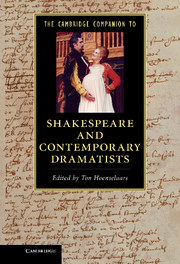Book contents
- Frontmatter
- Contents
- Illustrations
- Contributors
- Preface
- Chronology of the life and work of Shakespeare and contemporary dramatists
- 1 John Lyly and the University Wits
- 2 Thomas Kyd and the Elizabethan blockbuster
- 3 ‘The words of Mercury’
- 4 The dyer’s hand
- 5 Urbane John Marston
- 6 Thomas Dekker and the emergence of city comedy
- 7 Shakespeare
- 8 Thomas Heywood
- 9 George Chapman’s learned drama
- 10 Francis Beaumont and John Fletcher’s tragicomedy as musical melodrama
- 11 Thomas Middleton and the early modern theatre
- 12 John Webster
- 13 John Ford
- 14 Philip Massinger
- 15 Richard Brome and the idea of a Caroline theatre
- 16 Troublesome histories
- Select bibliography
- Index
- References
3 - ‘The words of Mercury’
Shakespeare and Marlowe
Published online by Cambridge University Press: 05 December 2012
- Frontmatter
- Contents
- Illustrations
- Contributors
- Preface
- Chronology of the life and work of Shakespeare and contemporary dramatists
- 1 John Lyly and the University Wits
- 2 Thomas Kyd and the Elizabethan blockbuster
- 3 ‘The words of Mercury’
- 4 The dyer’s hand
- 5 Urbane John Marston
- 6 Thomas Dekker and the emergence of city comedy
- 7 Shakespeare
- 8 Thomas Heywood
- 9 George Chapman’s learned drama
- 10 Francis Beaumont and John Fletcher’s tragicomedy as musical melodrama
- 11 Thomas Middleton and the early modern theatre
- 12 John Webster
- 13 John Ford
- 14 Philip Massinger
- 15 Richard Brome and the idea of a Caroline theatre
- 16 Troublesome histories
- Select bibliography
- Index
- References
Summary
Sick of fear
Shakespeare was haunted by Christopher Marlowe more than by any other Elizabethan writer. He may even have imagined their relation as a literal haunting, blaming this for his late start, and in the Sonnets asking whether it was ‘his spirit, by spirits taught to write / Above a mortal pitch, that struck me dead’. Any account of Shakespeare’s debt to his almost exact contemporary therefore has to begin, according to Harold Bloom in The Anatomy of Influence, with his inferiority complex as an ‘unlettered clerk’ crying ‘Amen’ (85) while Marlowe’s ‘great verse … my verse astonishèd’ (86), in his own words, and he exerted ‘all his might, / To make me tongued-tied’ (80). Bloom identifies the author of Tamburlaine and Faustus as the Rival Poet of the Sonnets because no other writer held such uncanny power over an audience as ‘that able spirit’ (85): ‘I imagine the young Shakespeare attending a performance of Tamburlaine with fascination. The possibility of the sublime of power was born at the moment of Marlowe’s impact.’ With its hyperbolic rhetoric and exotic nouns, Marlowe’s writing fits the description of ‘variation or quick change … new-found methods’ and ‘compounds strange’ (76) that the Sonnets attribute to the poet said to be ‘by all the muses filed’ (85). But in lines that may allude to Marlowe’s shadowy circle of backers, these poems also picture the unnamed writer with ‘his compeers by night / Giving him aid’ (86), as if Shakespeare sensed and resented something extra-literary about such superhuman empowerment.
- Type
- Chapter
- Information
- Publisher: Cambridge University PressPrint publication year: 2012

